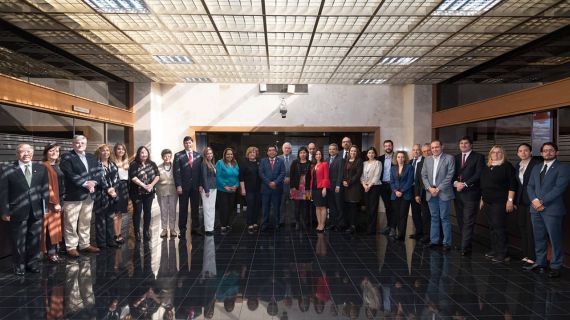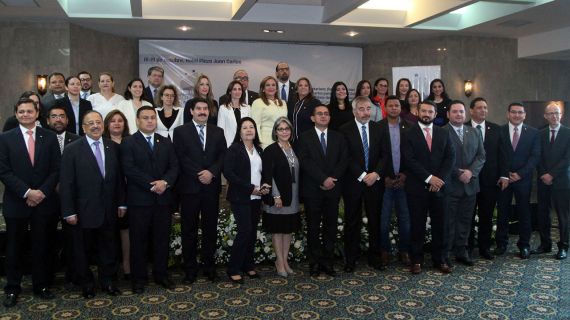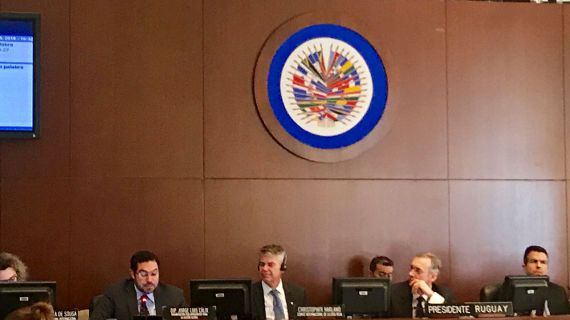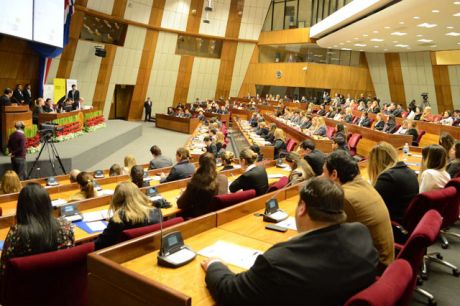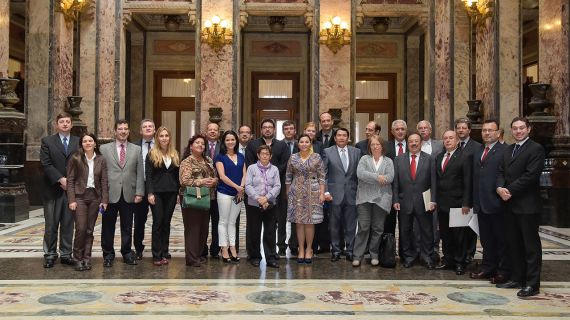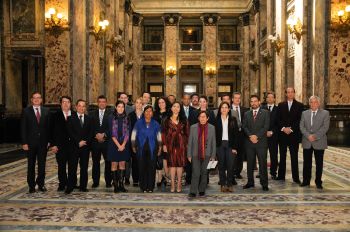During the Regional Seminar on International Justice organized by Parliamentarians for Global Action (PGA), legislators from Latin America met with experts in international law to reflect on the fight against impunity and accountability for international crimes on the continent. Participants and panelists had the opportunity to discuss several situations in the region under the current challenging global context caused by the COVID-19 pandemic and the social protests that have taken place in several countries.
In his introductory remarks, Senator Ivan Cepeda (Colombia), Co-Chair of the Peace Commission, member of the Second Constitutional Commission, and PGA member, reminded the audience that:
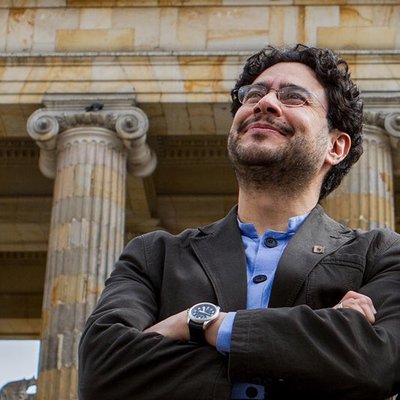 Our Congresses, our National Assemblies, and Parliaments play a decisive role in the national and international defense of justice in cases of international crimes to ensure that the victims obtain justice, reparation, and guarantees of non-repetition, not only through our role as legislators but also by exercising political control.
Our Congresses, our National Assemblies, and Parliaments play a decisive role in the national and international defense of justice in cases of international crimes to ensure that the victims obtain justice, reparation, and guarantees of non-repetition, not only through our role as legislators but also by exercising political control.Sen.Ivan Cepeda
Colombia
In this field, we have made unquestionable progress; however, I must also point out with sadness that in many parts of the world, crimes such as genocide, crimes against humanity, war crimes, and the crime of aggression continue to be perpetrated. Moreover, the pandemic, which has caused severe health, political, social, and economic havoc, has helped to dilute these issues and has even brought new modalities through which human rights are grossly violated.
With these words, Senator Cepeda opened the first panel, which addressed contemporary developments that contribute to the consolidation of international criminal law. In this regard, Mr. Hugo Relva, Legal Advisor of the International Secretariat of Amnesty International, emphasized that specific initiatives have a high potential to shape international criminal law. One of these major initiatives, is the draft Convention on Crimes against Humanity, which complements the Convention on the Prevention of Genocide and the Geneva Conventions on war crimes. At the same time, and strictly speaking, although the Rome Statute also punishes crimes against humanity, it is not a binding instrument for national judges when they prosecute those responsible for atrocity crimes. For this reason, this project, which unfortunately is stalled after the strong reluctance of some States such as China, Russia, and the United States, is more necessary than ever.
Another noteworthy initiative, as mentioned by Mr. Relva, is the draft Convention on Mutual Legal Assistance originally promoted by Belgium and the Netherlands. This project, which provides for multilateral cooperation in judicial matters, also aims to facilitate the extradition of those responsible for committing crimes such as genocide, crimes against humanity, and war crimes. Said Convention has the potential to improve inter-State cooperation in the fight against impunity and thus ensure accountability and enable States to be better equipped to prevent the commission of such crimes.
To conclude his presentation, Mr. Relva referred to the issue of immunities under international law, understood as those that any state official has before the jurisdiction of foreign courts, that is, when a state wants to exercise its jurisdiction based, for example, on the principle of universal jurisdiction or another principle of extraterritorial jurisdiction. Immunities, in that sense, is a complex issue that places a clear limit on international criminal justice. Nevertheless, the current draft articles elaborated on the subject contain a vital provision on immunities ratione materiae, which Amnesty International, among other key actors, considers a positive development. Even so, it should be noted that there is a latent risk that, under the influence of some States, the text may be changed negatively and end judicial processes initiated in several countries of the world under the principle of universal jurisdiction.
Indeed, Dr. David Donat Cattin, Secretary-General of PGA, emphasized that Latin America must continue playing a relevant role in the fight against impunity for international crimes. The region's history and the commitment that many States have made towards the "never again" legacy have enabled the continent to play a leading role in seeking justice for victims of international crimes.
As Dr. Cattin emphasized, a cohesive regional bloc, together with the support of the European Union and other States, will be of great importance to confront those who favor restricting the fight against impunity. It is essential to challenge those States that use the general principles of international criminal law, such as the principles of the irrelevance of official capacity or the responsibility of commanders and other superiors, to disregard the call of the international community to punish egregious crimes and provide reparations to victims of such acts. In his conclusion, the Secretary-Generalcalled on all parliamentarians to urge their governments to incorporate Article 27 of the Rome Statute (irrelevance of official capacity) in the draft Convention on Crimes against Humanity to avoid any path that would jeopardize the fight against impunity.
Referring specifically to the general overview of the Rome Statute amendments, Ms. Melissa Verpile, PGA Senior Legal Advisor, commented that the main objective of these amendments is to improve the Court's effectiveness in investigating and prosecuting crimes under its jurisdiction. Technological advances in the arms sector are expanding rapidly and being used against the civilian population. The use of weapons of mass destruction is a clear violation of all the principles and norms under international humanitarian law defended by law-abiding nations. It is therefore of vital importance that States take the necessary measures and steps to criminalize the unlawful use of such weapons.
Ms. Verpile emphasized that, since most Latin American States are Parties to the Rome Statute, it is their duty, under the principle of complementarity, to ratify and implement the amendments to the Statute. This step will help to strengthen national and international accountability systems. Unfortunately, only seven countries in the region have ratified the Kampala Amendments on war crimes, nine have ratified the crime of aggression, and the rest of the amendments have not been ratified by any country. PGA calls on the region's legislators to close this gap and ensure that their national legal systems are equipped with the highest standards for the protection of human rights and solid legislation that strengthens the fight against impunity for international crimes.
To conclude the first segment of the event, Mr. Eric Tardif, Legal Advisor of the International Committee of the Red Cross (ICRC) for Mexico and Central America, recalled the importance and critical role of the ICRC as the guardian of international humanitarian law. After a detailed analysis of the role of international humanitarian law and its conventions, in limiting and mitigating the effects caused by armed conflicts, Mr. Tardif emphasized that the States or High Contracting Parties to the four Geneva Conventions have an obligation to implement relevant provisions and take appropriate legislative measures to determine adequate penal sanctions to be applied against those persons who have committed, or have given the order to commit any grave breaches of the Conventions or its Additional Protocols.
Thus, for there to be effective legislation at the national level, it is necessary to comprehensively criminalize war crimes set out in the Geneva Conventions, including the Additional Protocol I. As Mr. Tardif stressed, both the Geneva Conventions and the Rome Statute of the ICC are interlinked instruments. However, these two instruments have some differences since there are certain crimes within the Statute that do not reflect precisely what the Conventions provide for and vice versa. Consequently, it is vital that these instruments be read in conjunction so States can implement effective national criminal legislation that includes all provisions of the Conventions and Additional Protocol I, while at the same time the crimes covered by the Rome Statute itself.
In the second segment of the event and following the remarks presented on the contemporary perspectives and advances in international criminal law, Mr. Alonso Illueca, Professor of International Law and Human Rights, focused his intervention on how regional instruments, including the Inter-American Human Rights System, can be translated into concrete and timely legislative actions.
Mr. Illueca conveyed that Latin America has distinguished itself for its contributions to international human rights law development and codification. Through different regional instruments and jurisprudence, the Inter-American Human Rights System has developed important standards that the States of the region can adopt through concrete legislative measures. Such actions, for instance, can be done through the ratification or approval of international instruments and their incorporation into the domestic legal system, exercising control of conventionality, or following up on the reparation measures adopted by the State or ordered by jurisdictional instances.
Mr. Illueca also highlighted that the jurisprudence of the Inter-American Court of Human Rights has been key in determining that States have an obligation to punish systematic or generalized human rights violations. Moreover, States must take concrete actions to avoid impunity by, among others, investigating and adjudicating such violations and safeguarding the right of victims to truth and effective remedy. Unfortunately, the absence or otherwise erroneous typification of international crimes and the confusion of the concept and content of atrocity crimes, contribute to impunity. For this reason, it is necessary that States ratify these instruments and that parliamentarians, making use of their prerogatives, take concrete legislative action to implement and even correct the definition of atrocity crimes in their national legal systems.
On this note, Resolution Nº 1/03 of the Inter-American Commission on Human Rights on Trial for International Crimes is quite clear: "States [should] adopt the legislative and other measures needed to ensure punishment for international crimes such as genocide, crimes against humanity, and war crimes."
Focusing more closely on the Rome Statute system, Professor of Public International Law, Ms. Michelle Reyes, and the International Criminal Court's External Relations and Cooperation Officer and Focal Point for Gender Equality, Ms. Antônia Pereira de Sousa, agreed on the importance of the principles of complementarity and cooperation as cornerstones of the Rome Statute system. States assume a dual role: from the point of view of complementarity, States must exercise primary jurisdiction to investigate and prosecute crimes under international law, and, from the cooperation perspective, States are one of the main guarantors of the Court's functioning.
Panelists emphasized that one of the most decisive elements of cooperation and complementarity is the full implementation of international crimes and principles at the national level. Regarding such implementation, several questions have arisen as to its mandatory nature. Implementation is a tacit obligation of States under the Rome Statute. Adapting national systems to regional and international standards, is beneficial as it strengthens them.
States, through their legislators, implement the crimes with the appropriate criminal definitions and the specific penalties, the general principles of international criminal law, and adopt specific provisions on cooperation. Article 86 of the Rome Statute imposes an obligation on States to cooperate with the Court, and, unlike the criminal definitions, there is an express obligation under Article 88 to implement and adopt domestic legislation on cooperation.
Asambleísta Esther Cuesta (Ecuador), Member of the Committee on Sovereignty, Integration, International Relations, and Integral Security of the National Assembly of Ecuador and President of PGA's National Group, presented Ecuador's experience with the implementation process in her country. In this regard, Asambleísta Cuesta congratulated the hard work of her former colleague, Asambleísta Soledad Buendía, who presented to the National Assembly on 7 November 2019, a Draft Law on Cooperation with the ICC based on the "PGA Model Law".
In 2020, the Legislative Technical Unit of the Assembly of Ecuador made observations and recommendations to the Cooperation Bill. Asambleísta Cuesta confirmed that her team has started the review process of this Bill and committed to presenting a new cooperation Project with the ICC in 2021. She also affirmed that the text of the Bill would include:
- The highest international standards;
- A guarantee of Ecuador's compliance in the application of the crimes under the Rome Statute; and
- A complementary and effective mechanism of cooperation with the ICC.
PGA, therefore, encourages other States in the region to take the same path as Ecuador and offers its technical assistance to achieve these objectives.
Ms. María Clara Nazar, Specialist in the Cooperation and Public Policy Section of the Inter-American Commission on Human Rights (IACHR) shared her intention to continue working collectively with legislators considering that their work is essential for the State's functioning and the fulfillment of the Commission's mandate. Ms. Nazar shared with the participants a compendium prepared by the Commission on the "Obligation of States to Adapt Their Domestic Legislation to the Inter-American Standards of Human Rights" to encourage legislators to bring their countries' domestic legislation in line with the system. As the expert pointed out, the Inter-American System imposes this obligation not only on the judiciary but on all public servants regardless of their position. Failure to correctly adapt the domestic regulations to these realities exposes the State to international responsibility.
To close this event, two great experts in the field, Ms. Minou Tavárez Mirabal, Member of the Board of Directors of the ICC Trust Fund for Victims, and Senator Roy Barreras (Colombia), President of the Peace Commission of the Senate, discussed a transcendental issue in the framework of international justice: the rights of victims of atrocity crimes to obtain justice and reparations.
As stated by Ms. Mirabal, the Rome Statute of the ICC plays a fundamental role in this field as it seeks to investigate and prosecute those most responsible for the commission of heinous crimes and prevent such crimes by strengthening the Rule of Law at a national and international level. The Rome Statute provides a novel element in the fight against impunity aimed at delivering comprehensive reparations to victims of these crimes. However, although the criminal justice system indicates that individuals are legally responsible for repairing the harm caused to victims, the implementation of reparations faces significant challenges since legal proceedings are often lengthy. Furthermore, those convicted are, in many cases, declared indigent and without assets, which prevents tangible and proper reparations. For this reason, the Fund's role in this area is of utmost importance to provide reparations to the victims of these serious violations.
Senator Barreras explained the regime of victims' rights in Colombia as a determining factor for peace and justice. Senator Barreras highlighted that Colombia had implemented one of the most ambitious projects globally regarding victims' reparations: Law 1448 of 2011. This Law ensured that attention, assistance, and comprehensive reparations were dictated to all victims of the armed conflict and made it possible for them to effectively enjoy their right to truth, justice, and reparations with guarantees of non-repetition.
The Final Agreement to End the Armed Conflict and Build a Stable and Lasting Peace was a unique opportunity that sought to end a 50 year-long conflict that has put enormous suffering to the Colombian society and unquestionable triumph of the Rule of Law. One of the central elements of this agreement, which unfortunately has not been fully implemented due to the backlash received from the new government, is to put the victims of the armed conflict in the front line to obtain full reparations from the State and their perpetrators.
In his closing remarks, Senator Barreras conveyed to the audience that:
 From Colombia, we appeal to all international scenarios, such as the present one, to remember something that everyone knows: the existence of democracy and, therefore, a Rule of Law that makes it a reality, depends on the respect of human dignity and on the inhabitants' ability to coexist without fear of retaliation from a dominant force exercise by the elites.
From Colombia, we appeal to all international scenarios, such as the present one, to remember something that everyone knows: the existence of democracy and, therefore, a Rule of Law that makes it a reality, depends on the respect of human dignity and on the inhabitants' ability to coexist without fear of retaliation from a dominant force exercise by the elites.Sen.Roy Barreras
Colombia









